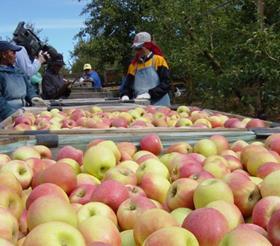
Following a record season last year, the volume of apples, pears and grapes exported by South Africa in 2014 is expected to decrease by 16 per cent, 10 per cent and 7 per cent respectively, according to a new report published by the USDA.
And with residual stocks said to be high in Europe, the country's fruit exports would be subject to tougher market conditions in 2014, the agency said.
'According to industry sources, there is growing focus to diversify South African exports to other markets especially, Africa, Middle East and Asian markets, which are believed to have less stringent import standards than Europe,' the report stated, adding that production of all three deciduous crops would remain flat this season as the rising costs of production and orchard and vineyard establishment constrained growth in planted area.
Unseasonal hail and rainfall had also damaged apple and pear production in late November 2013, the report confirmed, pushing a certain proportion of the crop to the domestic market or processing.
'Exceptionally good weather and growing conditions were experienced in the 2013 marketing year,' it concluded. 'This resulted in record production of apples, pears and grapes, the highest since 2003.'
Apple and pear production both increased by 9 per cent last year, while grape output was up 5 per cent on the 2012 figure.
Europe still remains the traditional market for South African apples, the USDA said, taking 38 per cent of total exports last season.
The equivalent figure for pears was almost double at 70 per cent of total exports, and even higher for grapes at 79 per cent.
South African apple exports to Zimbabwe are set to stop following the immediate ban of fresh fruits and vegetables by the Zimbabwean government in April 2014.
While South Africa is a net exporter of apples, pears and grapes, there is a gap for niche fruit imports,
especially the larger sized apples, and higher quality grapes.



